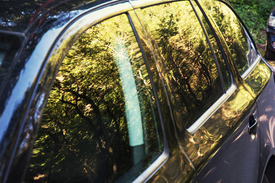
One trick played by auto dealers to boost their profits is to charge customers to etch the vehicle identification number (VIN) onto the windows of a car. The VIN is a 17 digit number that is unique to a specific motor vehicle. There is some evidence that car thieves are less likely to take a car with the VIN etched on the windows, and some insurance companies offer discounts for comprehensive insurance premiums if a car has VIN etching. So, this service may have some value.
But, most dealerships charge well over $100 for the service, and $189 seems to be the going rate in Connecticut; some dealerships charge even more. But, it doesn’t cost a dealership nearly that much to perform this “service”, and consumers can buy a kit etch the VIN onto their windows themselves for about $20. Some dealerships add a “protection plan” as part of their VIN-etching service that provides that, if a car is stolen, the consumer can get a discount if they buy another car at the dealership. That might have some value for some consumers, but in reality, the price that dealerships charge for VIN etching is way too high. Most of the cost of VIN-etching goes to dealership profits, and most consumer advocates advise against accepting VIN-etching.
Although VIN etching is optional, many dealerships will simply add the cost to a contract without telling the consumer. It is easy for dealerships to sneak this cost in, because (in Connecticut) the cost is usually preprinted right onto the purchase order. The last time that I bought a car, I told the salesman that I did not want VIN-etching, and he agreed to remove the charge. But, when the dealership’s business manager prepared the paperwork, I noticed that the cost for VIN-etching had been added back in! She removed it only after I insisted. Because the charge is preprinted on most purchase order forms, a consumer has to carefully review the figures and add them up to make sure that the charge isn’t included.
We have seen many instances where dealerships charge for VIN etching and do not even perform the service. While we do not recommend that our clients pay for VIN-etching, those who decide to buy it should at the very least get what they paid for!
Some dealerships will etch the VIN onto the auto glass as soon as it comes into its inventory. If a consumer objects to the charge, they will say that they already did the work and the charge has to be included. Don’t fall for it! The cost to the dealership to perform this “service” is minimal, and a good dealership will agree to drop the charge. If a dealership insists upon including the charge, then a consumer should consider walking away from the deal. Why do business with a company that would engage in shady practices like that?
Some dealerships’ practices with respect to VIN-etching are just plain fraudulent. Many consumers have told us that they were told that VIN-etching was mandatory. That is false. VIN etching is always optional. We have also seen many instances where a consumer is charged for VIN-etching for used cars even though the VIN had already been etched onto the windows before the dealership acquired the vehicle by trade-in or at auction.
Our advice to consumers: Check with your insurance company to see if you can get a discount for VIN-etching and if so, how much the discount might be. If you don’t get a discount, then forget it. If you do get a discount, then consider ordering a kit and doing the work yourself instead of paying an exorbitant price to a dealership. If a dealership tells you that you are required to get VIN- etching or that it has already been put on the car, tell them that you won’t pay for it – and be prepared to walk.
